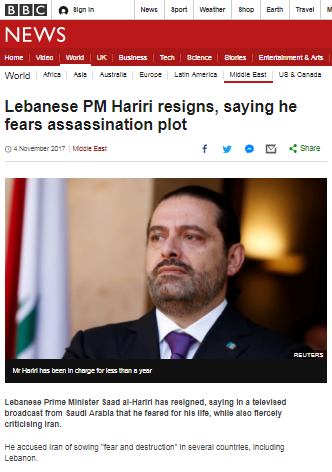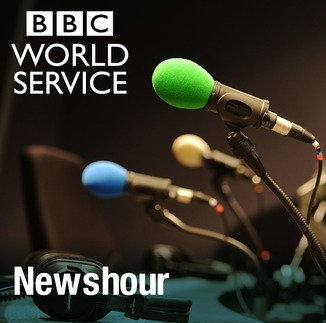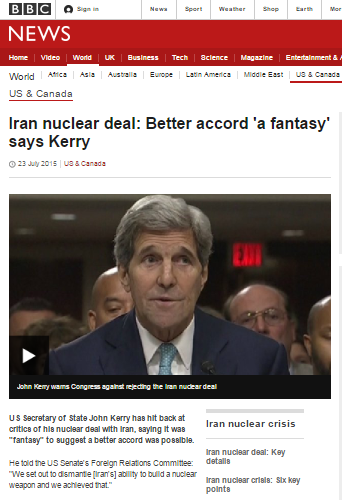The story of the Lebanese prime minister’s “stunning resignation” – as the BBC described it when news of Saad Hariri’s announcement broke on November 4th – can obviously only be fully understood if one is familiar with one of the other major players in that story: Hizballah.
Essential context to that story of course includes the background to the current political landscape in Lebanon – a story that was reported very superficially by the BBC at the time. Clearly too it is important to understand the extent of Hizballah’s influence within the Lebanese government and armed forces as well as the effects that Hizballah’s intervention and actions in other countries has had on Lebanon. An understanding of which countries and bodies designate Hizballah as a terrorist organisation is also crucial, as is familiarity with the extent to which Hizballah is financed and supplied by Iran – and how that translates into Iranian influence in Lebanon.
As one Middle East analyst put it:
“Over the last 11 months, Hariri became a fig-leaf for Hezbollah. As one of the main leaders of the opposition, his appointment as prime minister ostensibly proved Lebanon was maintaining its independence vis-a-vis Iran.
Now, however, the charade is over, and Lebanon remains as it was without the disguise — pro-Iranian, pro-Syrian, and with Hezbollah firmly in control. The Lebanese president is considered to be an Iranian and Hezbollah appointment, the Lebanese army is cooperating and coordinating with Hezbollah, and the Shiite terror group does whatever it likes in Lebanon.”
Since Hariri made his announcement the BBC News website has produced a considerable amount of coverage of the story. However, much of that reporting included softball portrayal of Hizballah which failed to provide BBC audiences with the context essential for full understanding of the story.
The website’s first article on the story – “Lebanese PM Hariri resigns, saying he fears assassination plot” (4/11/17) – whitewashed the financial and military support provided to Hizballah by Iran and airbrushed the terror group’s militia from view, calling it a ‘political party’. No explanation was given regarding the fact that the “political deadlock” was caused by Hizballah.
[all emphasis in bold added]
“Mr Hariri also attacked the Iran-backed Shia movement Hezbollah, which wields considerable power in Lebanon.”
“Taking up the prime minister’s office last year, Mr Hariri promised a “new era for Lebanon” after two years of political deadlock.
The coalition government he led brought together almost all of the main political parties in Lebanon, including Hezbollah.”
“In Lebanon, the Saudis support Mr Hariri while Iran backs the Shia movement, Hezbollah.”
A report appearing the next day – “Lebanon Hariri resignation a plot to stoke tension, says Iran” (5/11/17) – mentioned the murder of Hariri’s father without clarifying that Hizballah operatives have been indicted by the UN’s Special Tribunal for Lebanon.
“Rafik al-Hariri was killed by a bomb in 2005 in an attack widely blamed on the Iran-backed Shia movement Hezbollah, which wields considerable power in Lebanon.”
“The coalition government he led brought together almost all of the main political parties in Lebanon, including Hezbollah.”
A report titled “Lebanon PM forced by Saudis to resign, says Hezbollah” that appeared on the same day also failed to mention the STL, downplayed Iran’s financial and military support for Hizballah and once again failed to make any mention of its numerous terror designations.
“The leader of Lebanon-based Shia group Hezbollah has said that Saudi Arabia forced the Lebanese prime minister to resign.
Saad Hariri stepped down in a televised broadcast from Saudi Arabia on Saturday, denouncing Hezbollah and its Iranian backers, and saying he feared for his life.”
“As he resigned on Saturday, Mr Hariri blamed Iran for meddling in several countries, including Lebanon, and said he felt the climate was similar to that which “prevailed” before his father, former Prime Minister Rafik Hariri, was killed by a bomb in 2005.
The attack was widely blamed on Hezbollah, which wields considerable power in Lebanon but denies it was involved.”
“After taking office last year, Mr Hariri promised a “new era for Lebanon” after two years of political deadlock.
The coalition government he led brought together almost all of the main political parties in Lebanon, including Hezbollah.”
An article by Lyse Doucet – “Riyadh’s night of long knives and long-range missiles” (6/11/17) – briefly touched on some of the essential background that BBC audiences had hitherto lacked – albeit mostly in the form of quotes rather than her own analysis.
“Looking visibly distressed, Hariri spoke of fears for his life in his own country. He pointed an accusing finger at Iran for spreading “disorder and destruction”. And he charged that its Lebanese ally Hezbollah, a major Shia militia and powerful political force, with building a “state within a state”.”
“”By his actions, Hariri created a veneer of respectability for a state which in reality is captured by Hezbollah,” said Ali Shihabi.”
“One Western diplomat with long experience in the region highlighted possible next moves: withdrawal of major Saudi bank deposits; trade embargo; action by the Lebanese military, which the US and UK has long helped train and build in an effort to provide a national counterweight to Hezbollah’s military might.”
“Just last month, the US House of Representatives endorsed the imposition of new sanctions against Hezbollah as part of the Trump administration’s drive to exert greater pressure on Iran.
The measures, which have yet to become law, include a resolution urging the European Union to designate Hezbollah’s political wing, and not just its military wing, as a terrorist organisation.”
The BBC’s new Beirut correspondent Martin Patience also briefly referred to one crucial point in a report titled “Lebanon in crosshairs as Saudi-Iran tensions soar” (10/11/17) but again failed to clarify the real meaning of the phrase “Iran backs”.
“Iran backs the Shia movement Hezbollah here. Its supporters believe Mr Hariri’s resignation was orchestrated by the Saudis in order to weaken their influence in the country.
Hezbollah has been accused of operating a “state within a state”. Its armed wing is more powerful than the Lebanese army and it leads a bloc which dominates the cabinet.”
However, on the same day a report titled “France’s Macron makes surprise Saudi visit amid Lebanon crisis” (10/11/17) returned to vague phrasing.
“In the video statement, Mr Hariri also attacked Hezbollah, which is politically and militarily powerful in Lebanon, and Iran.”
Readers saw the use of a standard BBC euphemism – “militant group” – in a report titled “Lebanon Hariri crisis: President Aoun demands Saudi answers” (11/11/17) which made no effort to explain Iran’s financial and military support to Hizballah.
“Iran and its Lebanese ally, the militant group Hezbollah, accuse Saudi Arabia of holding Mr Hariri hostage.”
“He [Hariri] accused Iran and Hezbollah, a Shia group, of taking over Lebanon and destabilising the wider region.”
The same was seen in an article headlined “Saad Hariri: Lebanon return from Saudi Arabia ‘within days’” (13/11/17).
“He [Hariri] has blamed the Iran-backed Hezbollah movement for his resignation, citing concerns over his and his family’s safety.”
“”I am not against Hezbollah as a party, I have a problem with Hezbollah destroying the country,” he said.
The main problem for the region, he said, was “Iran interfering in Arab states”.”
On November 15th audiences saw the BBC’s first reference to Hizballah as an Iranian proxy in a report titled “Saad Hariri: Saudis detaining Lebanon PM says Michel Aoun” that gave a very limited description of its terror designation and made no effort to explain the background to the current political landscape in Lebanon. However – eleven days into the story – readers also saw the first mention of Hizballah involvement in the murder of Rafik Hariri.
“The Shia Islamist Hezbollah movement, an Iranian proxy that Riyadh considers a terrorist group, is part of the unity government that Mr Hariri formed last year.”
“Mr Aoun is a Maronite Christian former army commander who is an ally of the Islamist militia and political party Hezbollah.”
“His [Hariri’s] father Rafik – himself a former Lebanese prime minister – was killed in a suicide bombing in Beirut in 2005. Several members of Hezbollah are being tried in absentia at a UN-backed tribunal at The Hague in connection with the attack, though the group has denied any involvement.”
“Mr Hariri, a Sunni Muslim who became prime minister for the second time in late 2016 in a political compromise deal that also saw Mr Aoun elected president, has close ties to Saudi Arabia.”
The same reference to the STL appeared in a report titled “Saad Hariri: Lebanon PM ‘can go to France when he wants’” on November 16th along with a description of Hizballah as Iran’s “proxy”.
“Saudi Arabia has denied forcing Mr Hariri to resign in an attempt to curb the influence of its regional rival Iran and its Lebanese proxy Hezbollah, which is part of a national unity government that Mr Hariri formed last year.”
“His [Hariri’s] father Rafik – himself a former Lebanese prime minister – was killed in a suicide bombing in Beirut in 2005. Several members of Hezbollah are being tried in absentia at a UN-backed tribunal at The Hague in connection with the attack, though the group has denied any involvement.”
By November 18th Hizballah had again been downgraded to an “ally” of Iran with the report titled “Saad Hariri, Lebanon PM, to return to Beirut ‘in coming days’” making no mention of Iran’s patronage of the group or its terror designations.
“In a televised announcement, Mr Hariri accused Iran of sowing “discord, devastation and destruction” in the region. He also accused Iran’s ally in Lebanon, Hezbollah, which is part of a national unity government that Mr Hariri formed last year, of destabilising his nation.”
“He also said he feared for his life. Several members of Hezbollah are being tried at a UN-backed tribunal at The Hague over the car-bomb assassination of Mr Hariri’s ex-PM father, Rafik, in 2005.”
As we see, none of these BBC reports gave audiences a comprehensive view of Hizballah’s designation as a terror organisation by the United States, the Arab League, the Gulf Cooperation Council, Canada, France, the Netherlands and Israel and the designation of its so-called ‘military wing’ by the EU, the UK, Australia and New Zealand.
The majority of the reports (eight out of eleven) failed to clarify that Hizballah members have been indicted for the murder of a previous Lebanese prime minister.
Portrayal of the extent and significance of Hizballah’s influence on Lebanese politics and armed forces was mostly absent from the BBC reports and the role it played in the “political deadlock” before Saad Hariri became prime minister was ignored.
Most glaring, however, is the fact that none of these eleven reports made any effort to provide BBC audiences with details of the extent of Iran’s financial and military support for the terror group’s activities.
Clearly BBC audiences have not been provided with the full range of information necessary for proper understanding of this story.




